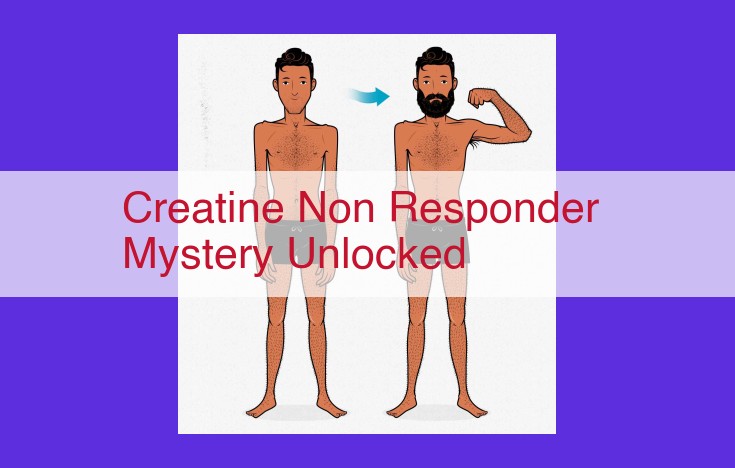Unlocking the enigma of creatine non-responsiveness, this study unveils the genetic and molecular mechanisms behind the disconnect between creatine supplementation and muscle performance. Exploring gene polymorphisms, creatine transporter activity, muscle creatine content, myostatin regulation, and ACTN3 genotype, researchers have identified the role of these factors in determining individual creatine responsiveness. With this newfound understanding, non-responders can now make informed decisions on optimizing their supplementation strategies or seeking alternative performance-enhancing approaches.
Unraveling the Mystery of Creatine Non-Responders
Creatine, a natural substance found in muscles, plays a pivotal role in energy metabolism and muscle performance. As a popular supplement, creatine has gained immense popularity among fitness enthusiasts seeking to enhance their workouts. However, not everyone experiences its benefits equally. A minority of individuals, known as creatine non-responders, fail to show significant performance improvements despite supplementation.
Understanding Creatine and Its Impact
Creatine serves as a vital energy source for muscle contractions. By increasing the availability of phosphocreatine, a high-energy molecule, creatine allows for explosive muscle movements and improved endurance. Research has consistently demonstrated the effectiveness of creatine supplementation in boosting strength, power, and overall athletic performance.
The Enigma of Creatine Non-Responsiveness
Despite its widespread benefits, some individuals remain immune to creatine’s performance-enhancing effects. This phenomenon, known as creatine non-responsiveness, challenges the universal efficacy of creatine supplementation. Scientists have long sought to unravel the mystery behind this unresponsiveness. Recent research has begun to shed light on the underlying mechanisms, revealing a complex interplay of genetic factors, muscle characteristics, and creatine transport dynamics.
Creatine Supplementation: Enhancing Muscle Performance and Energy Production
Creatine, a natural substance found in the body, plays a crucial role in boosting muscular energy. When we engage in high-intensity activities, creatine serves as a readily available fuel source for our muscles.
How does creatine supplementation work?
Creatine supplementation increases the muscle creatine stores, providing more fuel for explosive movements and improved power output. When we consume creatine, it is transported into muscle cells, where it combines with phosphate to form phosphocreatine (PCr). PCr acts as an energy reserve, quickly donating its phosphate to regenerate adenosine triphosphate (ATP), the primary energy currency of cells.
However, not everyone experiences the same benefits from creatine supplementation. Some individuals are known as “non-responders”, failing to show significant improvements in performance despite consuming creatine.
Limitations of Creatine Supplementation and the Concept of Non-Responders
Creatine supplementation is generally safe and well-tolerated, but it’s important to understand its limitations. Approximately 20-30% of individuals are non-responders, meaning they do not exhibit noticeable performance enhancements.
Why are some people non-responders?
The exact reasons for non-responsiveness are still being investigated, but several factors may contribute, including genetic influences and muscle characteristics. For example, reduced creatine transporter expression or impaired creatine uptake by muscle cells can limit creatine’s ability to enhance performance.
Muscle Performance and Non-Responsiveness: Exploring the Disconnect
Creatine supplementation has been widely acknowledged for its ability to enhance muscle performance and power output. However, not all individuals experience these benefits, leading to the intriguing phenomenon known as creatine non-responders. This condition presents a puzzling disconnect between creatine intake and its expected effects on muscle function.
Numerous factors contribute to overall muscle performance, including genetic predisposition, training intensity, and nutritional status. Creatine supplementation typically operates by increasing intramuscular creatine stores, which serve as a reservoir for muscle energy production. However, in non-responders, this mechanism appears to be compromised.
One key aspect is the efficiency of creatine uptake into muscle cells. This process is facilitated by a specialized protein called the creatine transporter (CrT). In non-responders, impaired CrT expression or function can hinder the entry of creatine into muscles, resulting in reduced muscle creatine content.
Moreover, muscle performance is influenced by the intricate interplay between multiple proteins and signaling pathways. Myostatin is a protein that plays a crucial role in regulating muscle growth and regeneration. Interestingly, studies have suggested that certain genotypes of the ACTN3 gene, which is involved in muscle fiber composition, may be associated with variations in myostatin levels. These variations could potentially influence creatine utilization and, consequently, muscle performance.
The disconnect between creatine supplementation and muscle performance in non-responders highlights the complex nature of human physiology. Elucidating the underlying mechanisms behind non-responsiveness requires a comprehensive understanding of these intricate interactions. By unraveling the factors that contribute to this condition, we can empower athletes and individuals to optimize their training strategies and potentially mitigate the limitations of creatine supplementation.
Unraveling the Genetic Enigma: Gene Polymorphisms and Creatine Non-Responsiveness
Creatine, a natural substance stored in our muscles, plays a crucial role in boosting muscular energy and enhancing physical performance. While many individuals witness remarkable improvements with creatine supplementation, a small subset known as creatine non-responders fails to reap these benefits. Scientists have uncovered genetic clues that shed light on this enigmatic phenomenon.
Creatine Transporter Gene (SLC6A8): The Gateway to Muscle Creatine
One key player in creatine uptake is the creatine transporter gene (SLC6A8). This gene encodes the creatine transporter protein, responsible for transporting creatine into our muscle cells. Individuals with certain polymorphisms or variations in the SLC6A8 gene may possess an impaired creatine transporter, leading to reduced creatine uptake into their muscles.
Impact of Reduced Creatine Transporter Expression
This diminished creatine uptake has severe consequences. Creatine supplementation aims to elevate muscle creatine content, which in turn enhances energy production during high-intensity exercise. However, in non-responders with reduced creatine transporter expression, this process is inefficient. They fail to accumulate sufficient creatine in their muscles, hindering the performance-enhancing benefits of supplementation.
Seeking Solutions for Non-Responders
The discovery of genetic influences on creatine non-responsiveness opens avenues for exploring targeted interventions. By understanding the specific genetic variations that contribute to this condition, researchers can develop personalized approaches to creatine supplementation. This tailored approach may involve optimizing creatine intake protocols or exploring alternative performance-enhancing measures to empower non-responders and unlock their true athletic potential.
The Creatine Transporter: The Gateway to Muscle Creatine
Creatine, a natural substance found in the body, plays a vital role in muscle energy production. To maximize its benefits, creatine supplementation is widely used to enhance muscle performance. However, some individuals fail to respond to creatine supplementation, a phenomenon known as creatine non-responsiveness. Understanding the mechanisms behind this non-responsiveness is crucial for developing effective strategies.
The creatine transporter (CrT), a protein located on the surface of muscle cells, facilitates the entry of creatine into these cells. Impaired CrT expression or activity can disrupt creatine uptake, leading to reduced muscle creatine content. This reduced content diminishes the ability of creatine to enhance energy production during muscle contractions.
Studies have shown that variations in the SLC6A8 gene, which encodes the CrT protein, can influence creatine uptake. Individuals with specific gene polymorphisms may have reduced CrT expression or activity, resulting in lower muscle creatine content and, consequently, diminished creatine responsiveness. Understanding these genetic factors can help identify individuals who may not benefit optimally from creatine supplementation.
Optimizing creatine uptake and muscle creatine content is essential for maximizing the benefits of creatine supplementation. Strategies to improve CrT function or increase muscle creatine content, such as adjusting supplementation protocols or exploring alternative performance-enhancing measures, can empower creatine non-responders with informed strategies to achieve their fitness goals.
Muscle Creatine Content: The Key to Understanding Creatine Responsiveness
In the quest for improved performance, creatine reigns supreme as a muscle-boosting supplement. However, not all athletes bask in its glory. A select few, known as creatine non-responders, remain indifferent to its effects. To unravel this mystery, we must delve into the critical determinant of creatine responsiveness: muscle creatine content.
Why Muscle Creatine Content Matters
Creatine’s performance-enhancing magic stems from its ability to replenish phosphocreatine, the body’s primary energy source during intense exercise. High muscle creatine content ensures ample phosphocreatine stores, powering explosive movements and delaying muscle fatigue.
Factors Affecting Creatine Content
In creatine non-responders, the muscle’s ability to accumulate creatine falls short. This deficiency can stem from various factors:
- Inefficient Creatine Uptake: The creatine transporter, a protein that shuttles creatine into muscle cells, may be compromised.
- Increased Creatine Breakdown: Non-responders may exhibit increased creatine breakdown, reducing its availability for storage.
Uncovering the Genetic Influence
Genetic variations play a role in creatine responsiveness. The SLC6A8 gene, which encodes the creatine transporter, carries polymorphisms that affect its expression. Individuals with certain genetic variants may have reduced creatine transporter levels, hindering creatine uptake into muscle.
Myostatin and Creatine Utilization
Myostatin, a protein that regulates muscle growth, also influences creatine utilization. High myostatin levels can impair creatine uptake and reduce muscle creatine content. The ACTN3 genotype, which affects muscle fiber composition, may also influence myostatin levels and creatine responsiveness.
The key to understanding creatine responsiveness lies in muscle creatine content. Non-responders face challenges in accumulating creatine due to inefficient uptake or increased breakdown. Genetic variations, such as those in the SLC6A8 gene, can impact creatine transporter function. Additionally, myostatin and ACTN3 genotype may influence creatine utilization. By recognizing these factors, we can personalize creatine supplementation strategies and explore alternative performance-enhancing approaches for non-responders.
Myostatin: An Unexplored Regulator in Creatine Responsiveness
Creatine has emerged as a popular supplement for enhancing muscle performance. Yet, a perplexing mystery surrounds the existence of individuals who fail to respond to creatine supplementation, known as creatine non-responders. Delving into the depths of this phenomenon, researchers have unearthed a fascinating connection between myostatin, a muscle-regulating protein, and creatine responsiveness.
Myostatin, a protein encoded by the MSTN gene, exerts a profound influence on muscle growth and performance. It acts as a natural brake, limiting muscle development. Intriguingly, studies have unveiled a captivating link between ACTN3, a gene that influences muscle fiber composition, and myostatin levels.
Individuals with the ACTN3 XX genotype, characterized by slower muscle fibers, exhibit elevated myostatin levels. This genetic makeup potentially translates into reduced creatine responsiveness. Why? Because myostatin may hinder the uptake and utilization of creatine, thereby dampening its performance-enhancing effects.
This novel insight opens up new avenues for understanding creatine non-responsiveness. By deciphering the complex interplay between myostatin and creatine metabolism, we can empower creatine non-responders with informed strategies. Tailored supplement protocols, optimized training programs, or alternative performance-enhancing measures may prove invaluable in maximizing their muscle potential.
Unveiling the secrets of creatine non-responsiveness requires further research. Yet, the tantalizing connection between myostatin, ACTN3 genotype, and creatine utilization paints a promising picture. By illuminating these genetic and physiological underpinnings, we can pave the way for personalized supplementation and performance optimization.
ACTN3 Genotype: Unraveling the Impact on Creatine Utilization and Muscle Performance
In the world of sports nutrition, creatine has emerged as a widely used supplement, renowned for its ability to enhance muscle performance. However, not all individuals experience these benefits, a phenomenon known as creatine non-responsiveness. Research has shed light on the role of genetic factors, particularly the ACTN3 genotype, in determining creatine responsiveness.
ACTN3 Genotype and Muscle Fiber Composition
The ACTN3 gene encodes a protein called alpha-actinin-3, which plays a crucial role in the formation and maintenance of muscle fibers. Different variations or genotypes of ACTN3 can influence muscle fiber composition and their ability to utilize creatine.
Muscle Fiber Types and Creatine Utilization
Muscle fibers come in two main types: Type II and Type I. Type II fibers, also known as fast-twitch fibers, are primarily responsible for power and speed, and have a higher concentration of creatine receptors. In contrast, Type I fibers, or slow-twitch fibers, are responsible for endurance and have a lower creatine uptake capacity.
Individuals with the ACTN3 XX genotype have a higher proportion of Type II fibers, making them more likely to exhibit creatine responsiveness. Conversely, those with the ACTN3 RR genotype have a higher proportion of Type I fibers, potentially reducing their responsiveness to creatine supplementation.
Myostatin and Creatine Utilization
Myostatin is a protein that plays a role in regulating muscle growth and development. Interestingly, the ACTN3 genotype has been linked to variations in myostatin levels. ACTN3 XX individuals tend to have lower myostatin levels, which may promote muscle growth and creatine utilization.
Implications for Creatine Supplementation
The impact of ACTN3 genotype on creatine utilization has important implications for athletes and individuals using creatine supplementation. Those with the ACTN3 XX genotype may experience more significant improvements in muscle performance with creatine supplementation, as they possess a more favorable muscle fiber composition and myostatin profile for creatine utilization.
On the other hand, ACTN3 RR individuals may have a reduced response to creatine supplementation due to their lower proportion of Type II fibers and potentially higher myostatin levels. Alternative performance-enhancing strategies, such as optimizing training protocols or exploring other supplements, may be more suitable for this group.
The ACTN3 genotype plays a role in determining muscle fiber composition and myostatin levels, which can influence creatine responsiveness. Understanding your ACTN3 genotype can provide valuable insights into your unique response to creatine supplementation and help you tailor your performance strategies accordingly.




